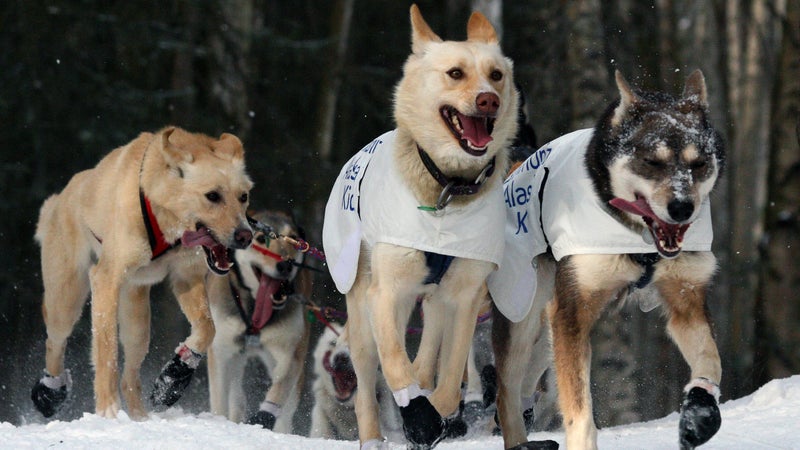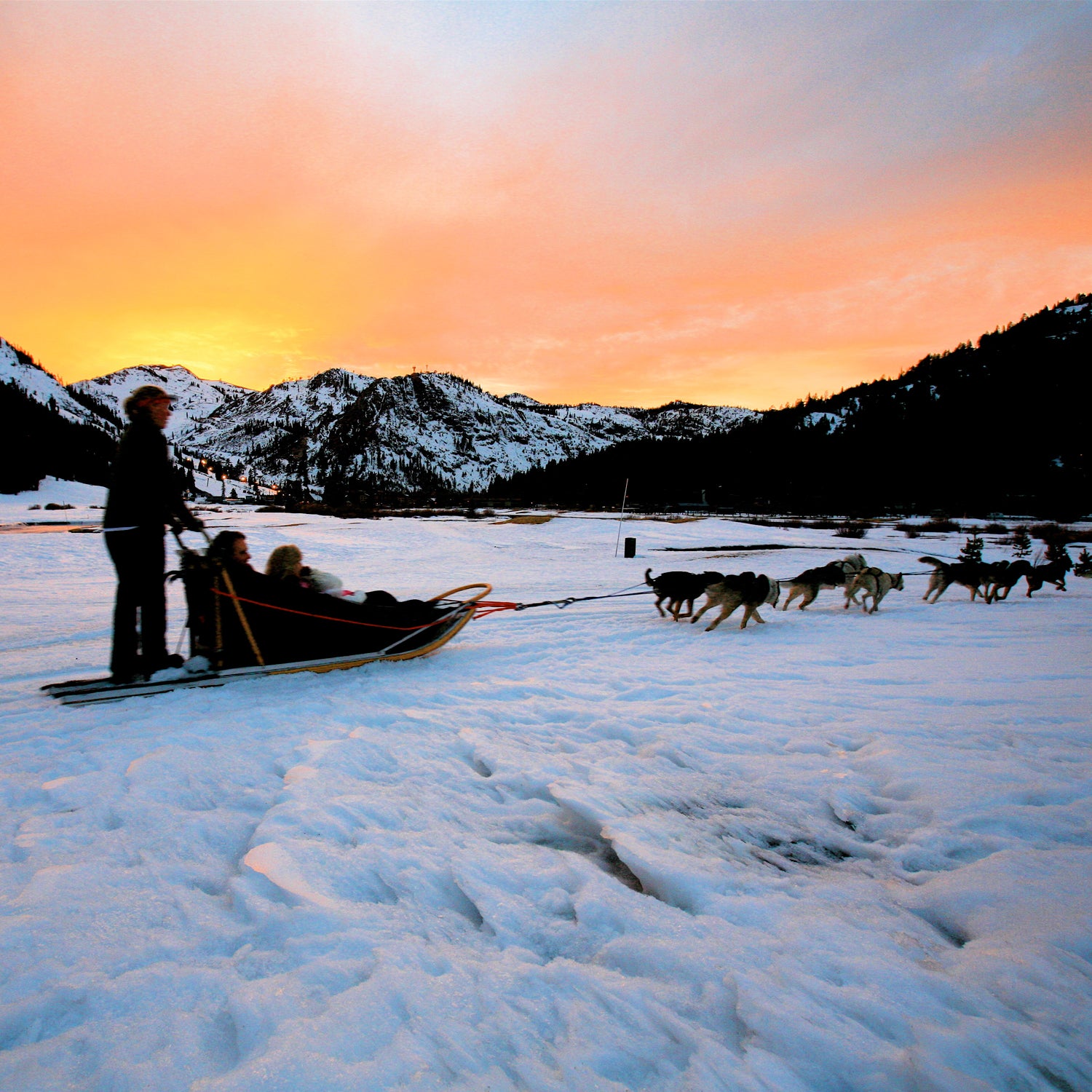Diana Haecker and Nils Hahn are typical Alaskan mushers.
They live on a seven-acre property just outside Nome with their young daughter and their 24 sled dogs. They operate a racing kennel, work at the Nome Nugget newspaper, and race for fun; Hahn has participated in the Iditarod four times and Haecker plans to compete next year. Sometimes they even use their dog teams to commute to work and pick their daughter up from school. In heavy snow, it’s more convenient than a car, they say.
But it’s a lifestyle that’s increasingly at risk. Mushing was a common, reliable form of transportation in Alaska for thousands of years. But after Alaska became a state in 1959, snowmachines started replacing dog teams. Then the Iditarod, an annual 975-mile dogsled race through the Alaskan wilderness, was founded in 1973. The sport gained popularity again, but also infamy as competitive mushing came under attack by animal-rights activists. Now there’s a new threat: Alaskans who want to end the practice because, they allege, the dogs are a nuisance.
Three years ago, one of Haecker and Hahn’s neighbors filed a lawsuit against the couple, alleging that the dogs are a menace and seeking to remove the two dozen animals from the couple’s care. After researching what rights they have as sled-dog owners, Haecker and Hahn learned that mushers around the state are experiencing similar hostility.
“[We have heard about] people setting off fireworks, setting traps on the trails, shooting off firearms” at sled teams, Haecker says. It scares the dogs and mushers, and can physically harm the team. “This is not subtle,” she says.
In response to the pressure, Haecker and Hahn drafted a two-page in 2013 for the Alaska State Legislature. It states that “dog mushers who treat their dogs humanely…need the support of the people of the state so they can preserve the tradition and culture of dog mushing for future generations.” Governor Sean Parnell .
[quote]“To expect sled dogs to behave like the dog that makes it outside twice daily to pee is comparable to me asking Lindsey Vonn to confine herself to the lodge just because I can’t ski.”[/quote]
Although there’s no legal weight to the governor’s announcement, it has already prompted the creation of pro-mushing regulations in at least one municipality. If Haecker and Hahn have their way, Alaska will adopt laws that support all mushers. They believe legislation will not only protect a way of life, but also the state’s premiere sporting event: the Iditarod.
“The Iditarod needs mushers and a mushing community that is alive and well,” Haecker says. Perhaps most important to the state, the Iditarod brings in billions in tourism dollars from those who come to watch the race, going on right now, and from tourists who come to try their hand at mushing. From May to September 2014, Alaska’s 1.7 million visitors spent $2.3 billion dollars, according to a report from Alaska’s Department of Commerce, Community, and Economic Development. About a quarter of them say they came for a dogsledding experience.
Granted, it’s hard to find evidence that the money, or the state’s iconic dogsledding race, helps recreational racers like Haecker and Hahn, who say they spend about $30,000 per year on dog food alone. Include expenses like kenneling, check-ups, and sledding equipment and maintenance, and the cost can exceed $50,000.
Middle-of-the-pack teams will pocket anywhere from $2,000 to $30,000 in prize money, while spending $3,000 on registration. The top finisher at this year’s Iditarod, who will be someone who likely runs a much bigger operation than the majority of entrants, will receive a $70,000 prize purse. Even for the most serious competitive mushers, any prize money is a pittance compared to the expenses of raising a top-notch dog team.
Because of the high costs and low purse, mushers rely on sponsors to fund their team for races. The Iditarod in turn relies on those sponsors and in-kind donations since it sells no tickets—the event takes place entirely on public trails. But as animal-rights activists continue to pressure companies not to support a sport they’ve deemed inhumane, sponsors have backed out. The Sled Dog Action Coalition lists 41 companies that have of the Iditarod or a musher in the Iditarod. That flagging sponsor money is crowding out mushers on the margins.

Lawsuits like the one filed against Haecker and Hahn don’t help, and it touches on a core disagreement about the nature of the human-dog relationship. On one side are people like Joyce Tischler, founder of the . “Our dogs are companions,” not laborers, she says. On the other side are people like Michael Davis, a professor of veterinary health sciences at Oklahoma State University who has studied sled dogs for years, who says sled dogs don’t belong in the same category as household dogs and shouldn’t be held to the same domestic benchmarks.
Sled dogs “are athletes and, like any other athlete, they are capable of doing things that the average human or dog can’t,” Davis says. “To expect them to behave like the dog that makes it outside twice daily to pee is comparable to me asking Lindsey Vonn to confine herself to the lodge just because I can’t ski.”
Inspired by Haecker and Hahn’s Right to Mush resolution, kennel owner Vern Halter decided it was time to start safeguarding Alaska’s mushing culture. In November, Halter in his hometown of Matanuska-Susitna Borough, a mushing hotspot near Fairbanks that’s also the state’s fastest-growing town.
The ordinance reclassifies sled dogs as livestock instead of pets. It gives dogs and kennel owners additional protections, like allowances for noise levels and other possible complaints from new neighbors. It also sets high standards for feeding and care—a nod to the concerns of the animal rights activists. The regulations are designed to clarify the rights and responsibilities of mushers and stave off conflicts. But its real achievement is solidifying the mushing culture in the town’s laws.
That type of law will have to be passed statewide to truly protect Alaska’s mushing culture, Haecker and Hahn believe. They’re currently devising language for new rules. But a state-level campaign will have to wait until they’ve dealt with their own lawsuit.
“The freedom to engage in our state ‘sport,’ most of us take for granted until someone tries to litigate you out of it,” Haecker says.


